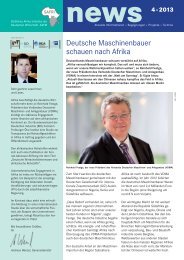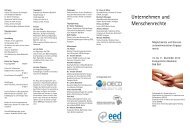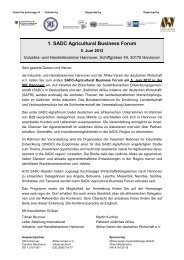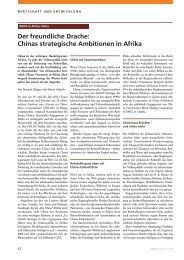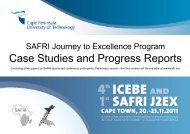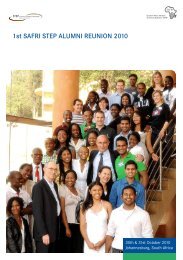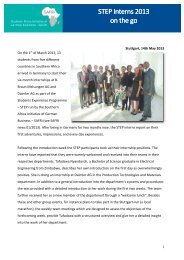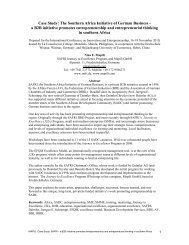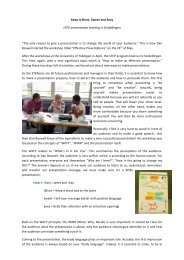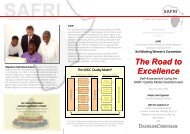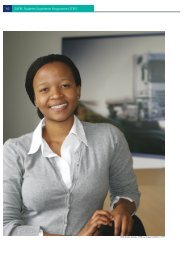conference programme - icebe.net
conference programme - icebe.net
conference programme - icebe.net
Create successful ePaper yourself
Turn your PDF publications into a flip-book with our unique Google optimized e-Paper software.
Paper Abstracts—In Alphabetical Order of Presenters<br />
39<br />
CHALLENGE YOUR CHALLENGES<br />
MARGARET BENNETT, CYNTHIA KAIMU<br />
SME Development and Support at the Polytechnic of Namibia Centre for<br />
Entrepreneurial Development (CED)<br />
ABSTRACT<br />
This paper provides a brief background of the current socioeconomic<br />
situation in Namibia and the pertinent role of Small and<br />
Medium Enterprises (SME’s) in combating the high level of unemployment.<br />
Inadequate capacity in both the public and private sectors<br />
has been identified as one of the main bottlenecks for sustainable<br />
development in Namibia.<br />
It is imperative that educational Institutions join national efforts to<br />
spearhead and develop required skills. CED provides training and<br />
mentorship <strong>programme</strong>s with funding from development partners in<br />
the quest to challenge national challenges. These produced astounding<br />
results evidenced in the case studies below:<br />
Mr. Jeremia Kahambea is owner and manager of Jergo’s Cleaning<br />
Services CC’s, a waste management business established after the<br />
outsourcing of a section of Waste Management by a local<br />
Municipality. Mr. Kahambea, although experienced in waste<br />
management had inadequate business management skills. Today<br />
after the training and mentorship through CED, he operates a<br />
successful business with more than 25 employees and a growing<br />
client base.<br />
Ms. Katrina Haidula owns Pillow Manufacturing and Distributor CC,<br />
a pillow manufacturing bussiness. She enrolled for CED training and<br />
mentorship <strong>programme</strong> that equipped her with relevant skills,<br />
enabling her to increase her production capacity, sales and in,<br />
increasing monthly profits.<br />
RE-CURRICULATING: CAN AN ENGINEERING LECTURER<br />
CONTRIBUTE TO MEET 21 ST CENTURY AFRICA’S CHAL-<br />
LENGES?<br />
KANT ELIAB KANYARUSOKE<br />
Cape Peninsula University of Technology, Cape Town, South Africa<br />
ABSTRACT<br />
Africa faces great challenges in harnessing its resources for the<br />
benefit of its people in an increasingly competitive world. Lack of<br />
understanding of engineering, and failure to deploy modern technology<br />
are arguably the root cause of these challenges. The continent’s<br />
engineering education institutions are therefore expected to<br />
help change this. But they have their own well documented problems.<br />
I review these and point out others. I argue that solutions to<br />
some can come from within the academics and institutions with or<br />
without government help:Curriculum, textbooks, student motivation,<br />
etc. are addressed. I propose and illustrate the principle of Student<br />
Participatory Dynamic Flexibility in Curriculum. It is shown that the<br />
approach can help hasten learning of engineering and be used as<br />
one of the means to help transform Africa’s supply chains. Finally,<br />
recommendations to various university based stake holders are<br />
given: the students – who should be adaptive to rapid changes in<br />
curricula; lecturers – who must adopt flexibility, seek industrial exposure,<br />
exploit the technological vacuum and write suitable books; the<br />
administrators – who should re-examine policies in line with relative<br />
values of teaching, research and society service.<br />
Key words: Engineering curriculum; Engineering education; Africa’s<br />
challenges; Thermodynamics course.




